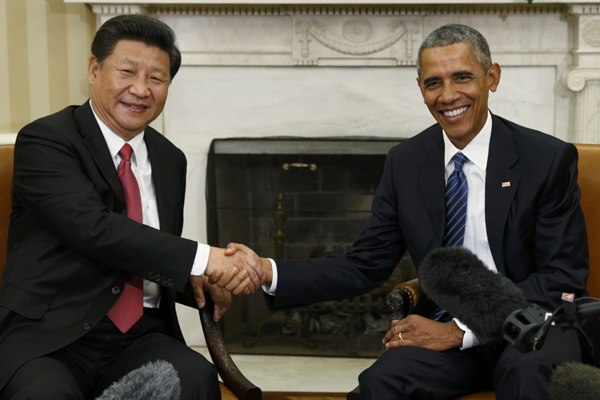 |
|
US President Barack Obama (R) welcomes Chinese President Xi Jinping in the Oval Office of the White House in Washington September 25, 2015. [Photo/Agency] |
From the alleys in Anaafo Sekondi, my hometown, to those in Bronx New York, right up to those in the water town of Wuzhen in East China Zhejiang Province, the Internet has permeated the very fabric of communities around the globe, and as a communication tool has become mankind's greatest friend and foe.
The latter, in my opinion should take the front stage as policymakers, Internet giants, cybersecurity experts and civil society organizations around the world converge in Wuzhen to look for comprehensive regulations to maintain decency in cyberspace.
As a friend, the Internet in the past decade has catapulted the global economy into ascension, where for example grassroots businesses in Africa are connecting with global clients through the power of e-commerce.
In an era where both developed and developing nations rely heavily on innovative entrepreneurship, the Internet remains the backbone of brilliant start-ups that have taken the world by storm. Start-ups without which the global economy would have been virtually void of innovation.
It is for this reason that the next conference on safeguarding the Internet, themed "An Interconnected World Shared and Governed by All - Building a Cyberspace Community of Shared Destiny" should make cyber security a top priority.
In September this year when President Xi Jinping met with President Obama during the former's official state visit to the US, both leaders agreed to establish what Obama called the 'international rules of the road for appropriate conduct in cyberspace' with other nations.
Obama, in a news briefing said the two countries have reached a common understanding and agreed not to 'conduct or knowingly support cyber-enabled theft of intellectual property, including trade secrets or other confidential business information for commercial advantage'.
President Xi in response said dialogue and cooperation needed strengthening considering the fact that both countries were major cyber countries. He reiterated that both sides have agreed 'to step up crime cases, investigation assistance and information-sharing', noting that 'both government will not be engaged in or knowingly support online theft of intellectual properties. He therefore called for the formulation of appropriate state, behavior and norms of cyberspace.
As over 2000 delegates from 120 countries unite in Wuzhen to debate on the development and future of the Internet, I do hope that the outcome of decisions and regulations they make would further expand coverage to deprived communities around the globe while protecting the holistic use cyberspace either on our cell phones, tablets, laptops, or desktops.
Personally, I do believe that the potential impact of the Internet on human history and communication has barely been scratched. Therefore expedient regulations that protect end users would determine whether the Internet would remain a friend or a foe.
The author is a senior blogger on China Daily online blog platform.
The opinion expressed here are those of the writers and don't represent views of China Daily website.